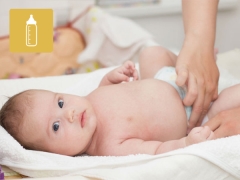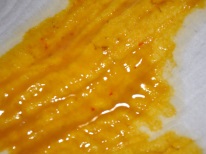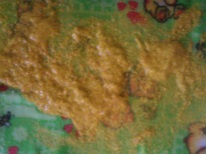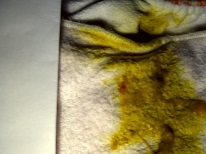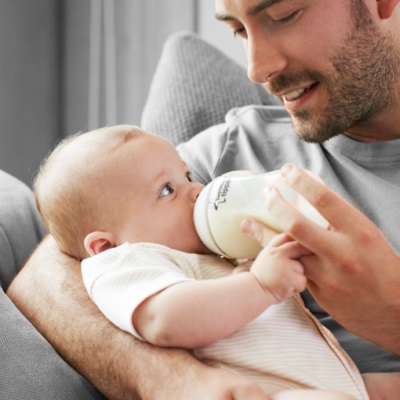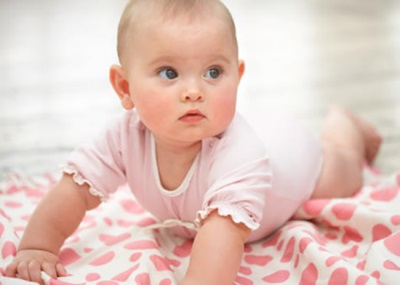Diarrhea in infants with artificial feeding
Changes to the stool of a small child are important for assessing the health of the baby. That is why parents should be able to distinguish normal stool from diarrhea in order to promptly call a doctor for the baby.
Signs of
To determine the diarrhea in infants, you should know what should be the normal chair of the child fed with the mixture. Normally, an artificial-fed baby’s stool is thicker than that of a breastfed baby. The color of the stool is often brown in color, and there is no impurity in the feces.
An artificial child often poops once a day, but a bowel movement up to 3-4 times a day is also considered the norm. When the child begins to give meals complementary foods, dense food causes the design of the chair and more rare excrement (once every 1-2 days).
How does it look
With diarrhea, the stool is runny, sometimes very watery. The stool smell can be offensive or sour. In appearance, feces are shiny, frothy. Different impurities can appear in it - greens, blood, pus, mucus, not digested food. The frequency of feces increases (more than 6 times a day), the baby often develops abdominal pain.
Possible reasons
The digestive tract of the infant during the first months of life is not fully developed, and enzymes are less active. It is difficult for babies to digest proteins and fats, especially for those children who are fed with mixtures. For this reason, when overfeeding the crumbs of artificiality, digestive disorders develop more frequently.
Since the protective function of the intestines in young children is insufficient, the digestive tract of babies are more susceptible to microbes, allergens and toxins. It is also a factor in the frequent onset of diarrhea in babies. It is because intestinal infections are the most common cause of the thinning of the stool in babies.
Diseases not related to the gastrointestinal tract, such as a cold or otitis, can also cause diarrhea in infants.
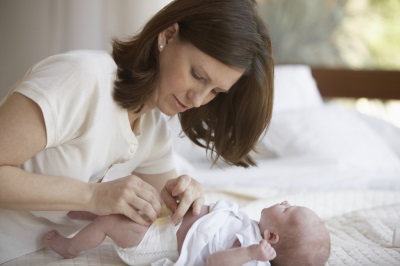
Other causes of diarrhea in an artificial baby can be:
- Change the mixture.
- Food poisoning.
- Early introduction of complementary foods.
- Teething.
- Lactose intolerance or gluten.
- Appendicitis or intestinal obstruction.
- Medications (very often these are antibiotics).
- Worm infestation.
- Cystic fibrosis.
- Pancreatitis.
- Stress.
- Contaminated hands, toys, dishes.
- Celiac disease
- Dysbacteriosis.
When to run to the doctor?
The greatest danger of diarrhea in a child younger than a year is the rapid development of dehydration in such young children, which threatens the health of the crumbs. If the child is less than 6 months old, you should call the doctor in any case of diarrhea.
The baby must be examined by a doctor if:
- The child has a baby, he is drowsy and lethargic, his skin is dry, his lips are cracked.
- Baby refuses to eat and drink.
- Urine stands out a little and it is dark.
- The diarrhea, despite the parents changing their diet and giving salt solutions, has increased or does not stop for 2-3 days.
- There is mucus and blood in the stool.
- The baby also has vomiting and increased body temperature.
Opinion E. Komarovsky
A well-known doctor reminds that the intestines of young children are very sensitive, so you should not experiment with mixtures and with complementary foods. Any changes in the diet of the baby should be gradual and agreed with the doctor.If food crumbs did not change, and the chair suddenly became liquid, then the most likely cause is an intestinal infection.
What to do?
It’s not a good idea to treat diarrhea in a small child, it’s better to call the doctor’s baby, remembering to leave one of the diapers for the doctor so that the specialist can see its contents and make the diagnosis more quickly.
After emptying, the crumbs need to be washed, and the skin around the anus should be lubricated with cream. No medicine can be given before the arrival of the doctor, except for the antipyretic, if the baby has a fever.
How to treat?
First of all, you need to take care of food and drink for the baby. Mix for the crumbs should be diluted by half, increasing the concentration of food only after the normalization of stool. If the child has already been given complementary foods, then at the time of treatment of diarrhea, all foods should be discarded.
It is important to replenish water lost during diarrhea, not forgetting about salts. That is why drinking crumbs with diarrhea should be given special salt solutions, which must certainly be in the first-aid kit in every home. Liquid should be given in small amounts every 10-20 minutes.
